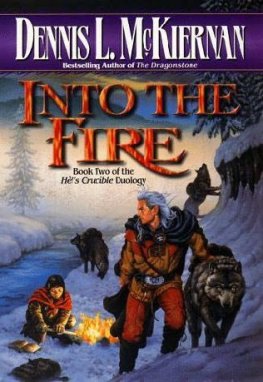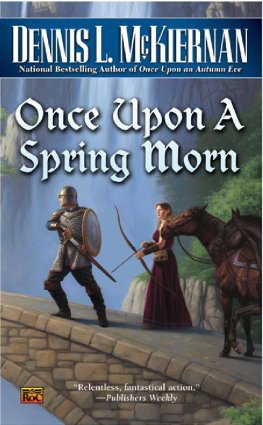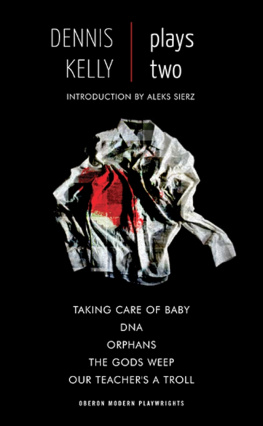Dennis McKiernan - Once Upon an Autumn Eve
Here you can read online Dennis McKiernan - Once Upon an Autumn Eve full text of the book (entire story) in english for free. Download pdf and epub, get meaning, cover and reviews about this ebook. genre: Romance novel. Description of the work, (preface) as well as reviews are available. Best literature library LitArk.com created for fans of good reading and offers a wide selection of genres:
Romance novel
Science fiction
Adventure
Detective
Science
History
Home and family
Prose
Art
Politics
Computer
Non-fiction
Religion
Business
Children
Humor
Choose a favorite category and find really read worthwhile books. Enjoy immersion in the world of imagination, feel the emotions of the characters or learn something new for yourself, make an fascinating discovery.

- Book:Once Upon an Autumn Eve
- Author:
- Genre:
- Rating:5 / 5
- Favourites:Add to favourites
- Your mark:
- 100
- 1
- 2
- 3
- 4
- 5
Once Upon an Autumn Eve: summary, description and annotation
We offer to read an annotation, description, summary or preface (depends on what the author of the book "Once Upon an Autumn Eve" wrote himself). If you haven't found the necessary information about the book — write in the comments, we will try to find it.
Once Upon an Autumn Eve — read online for free the complete book (whole text) full work
Below is the text of the book, divided by pages. System saving the place of the last page read, allows you to conveniently read the book "Once Upon an Autumn Eve" online for free, without having to search again every time where you left off. Put a bookmark, and you can go to the page where you finished reading at any time.
Font size:
Interval:
Bookmark:
Dennis L. McKiernan
Once Upon an Autumn Eve
Foreword
If you have read the forewords of the first two tales of my Faery series- Once Upon a Winters Night and Once Upon a Summer Day you will know my thesis is that once upon a time many (if not most) fairy tales were epics of love and seduction and copious sex and bloody fights and knights and witches and dragons and ogres and giants and other fantastic beings all scattered throughout the scope of the tale as the hero or heroine struggled on.
Bardic sagas were these, but as the minstrels and troubadours and sonneteers and tale-spinners and bards and other such dwindled, and common folks took up the task of entertaining one another with these well-loved sagas, I believe bits were omitted-fell by the wayside-and the stories grew shorter, or fragmented into several stories, or changed to fit the current culture or religion or whatever other agendas the tale-tellers might have had.
And so, if Im right, the grand and sweeping tales bards used to keep their royal audiences enthralled for hours on end became less and less as the tales were spread from mouth to mouth.
As the years went on, the stories continued to dwindle, until they became what the collectors of those tales-Andrew Lang, the Grimm brothers, and others-finally recorded and produced for others to read
or so it is I contend pale reflections of what they once were mere fragments holding a small portion of the essence and so on.
But guess what: they still hold audiences rapt.
They still charm.
They still are much admired by many, and certainly I am among those.
Even so, I would really like to hear some of these stories such as I have imagined them once to have been: long, gripping, romantic, perilous epics of love and hatred and loss and redemption and revenge and forgiveness and life and death and other such grand themes.
But told as a fairy tale.
Especially a favorite fairy tale.
Expanded to include all the above.
With Once Upon an Autumn Eve again I take a favorite of mine (in fact several favorites of mine woven together) to tell the tale as it once might have been told-as an epic, a saga, a story of length.
As with my other stories, since it is a romance in addition to being an adventure, once more you will find French words sprinkled throughout, for French is well suited to tales of love.
By the bye, the best-known version of the central story is but a few pages long. Once again, I thought that much too brief, and, as is apparent, I did lengthen it a bit. But then again, I claim that I am telling the real story, and who is to say I am not?
I hope it holds you enthralled.
Dennis L. McKiernan
1
Separated from the mortal world by looming walls of twilight is a wondrous place called Faery. It is now quite difficult a to find, though once upon a time is it wasnt. Faery is a place of marvel and adventure and magic and peril, populated by mythical and mystical creatures and uncommon beings along with ordinary folks-if anyone who lives in Faery can be said to be ordinary. Yet the creatures and beings of Faery arent the only things of enchantment, for there are items of magic within-grimoires, amulets, swords, rings, cloaks, helms, and the like, most of them quite rare. Even the lands of Faery are numinous, for Faery itself is composed of many mystical realms, rather like an enormous and strange jigsaw puzzle, the individual domains all separated from one another by great tenebrous walls of twilight. And like a mystifying riddle, some of the realms touch upon many others, while some touch upon but few. Caution must be taken when stepping through these dusky walls in going from one place to another, else one might end up somewhere altogether different from where one intended. Too, directions in Faery do not seem to be constant; there may be no true east, south, west, and north, though occasionally those compass points are ascribed by some therein, for when one goes from realm to realm, bearings seem to shift. Instead it may be more accurate to say that east, south, west, and north respectively align with sunup or dawnwise, sunwise, sundown or duskwise, and starwise. Whether or not this jigsaw puzzle makes an overall coherent picture is questionable, for each of the pieces, each of the domains, seems unique; after all, tis Faery, an endless place, with uncounted realms all separated from one another by looming walls of shadowlight, and with Faery itself separated from the common world by twilight as well.
Among the many remarkable domains within this mystical place are the Forests of the Seasons. In one of these four woodlands eternal autumn lies upon the land; here it is that crops afield remain ever for the reaping, and vines are overburdened with their largesse, and trees bear an abundance ripe for the plucking, and the ground holds rootstock and tubers for the taking. Yet no matter how often a harvest is gathered, when one isnt looking the bounty somehow replaces itself. How such a place can be-endless autumn-is quite mysterious; nevertheless it is so.
On one side of this magical realm and separated from it by a great wall of twilight is another equally enigmatic province, a domain graced by eternal summer, and it is a region of forests and fields, of vales and clearings, of streams and rivers and other such scapes, where soft summer breezes flow across the weald, though occasionally towering thunderstorms fill the afternoon skies and rain sweeps oer all.
Likewise, on a different side of the autumnal realm, beyond another great wall of half-light, there stands a land of eternal winter, where snow ever lies on the ground, and ice clads the sleeping trees and covers the still meres or, in thin sheets, encroaches upon the edges of swift-running streams, and the stars at night glimmer in crystalline skies.
And farther on and past yet another twilight border lies a place of eternal springtime, where everlasting meltwater trickles across the soil, and trees are abud and blossoms abloom, where birds call for mates and beetles crawl through decaying leaves and mushrooms push up through soft loam, and where other such signs of a world coming awake manifest themselves in the gentle, cool breezes and delicate rains.
These four provinces are the Autumnwood and Summerwood and Winterwood and Springwood, four of the many magical domains in the twilit world of Faery.
And as to these four regions, a prince or a princess rules each-Liaze, Alain, Borel, and Celeste-siblings all: the sisters Liaze and Celeste, respectively having reign oer the Autumn- and Springwoods; their brothers Alain and Borel respectively the Summerand Winterwoods.
They loved one another, these siblings, and seldom did trouble come their way. Oh, there was that strangeness with Borel and his dagger-filled dreams, yet he had managed to successfully deal with that perilous episode. And earlier, there was that difficulty with the disappearance of King Valeray and Queen Saissa, and the two curses leveled upon Prince Alain, but Camille had come along to resolve those trials.
After Borels harrowing ordeal, everything seemed quite well, though the Fates would have it that there yet loomed a portent of darker days to come. But at that time joy lay upon the land, for Camille and Alain were newlyweds, and Borel and his truelove Michelle had gone off immediately after those nuptials to see Chelles sire and dam, after which the banns would be posted and preparations for another wedding would get underway.
Yes, at that time all was well in these Forests of the Seasons, or so it seemed.
But then
Once upon an autumn eve
Sss the arrow sped true to- thock! strike the silhouette, fair spitting the heart of the Goblin. Again and again Liaze winged shafts into the ebon shape, while off to one side Handmaiden Zoe marveled at the skill of her tall and lithe auburn-haired mistress. And even though the sun was nigh gone, still in the long shadows lying across the sward the princess did not miss.
Font size:
Interval:
Bookmark:
Similar books «Once Upon an Autumn Eve»
Look at similar books to Once Upon an Autumn Eve. We have selected literature similar in name and meaning in the hope of providing readers with more options to find new, interesting, not yet read works.
Discussion, reviews of the book Once Upon an Autumn Eve and just readers' own opinions. Leave your comments, write what you think about the work, its meaning or the main characters. Specify what exactly you liked and what you didn't like, and why you think so.



